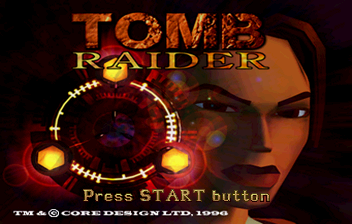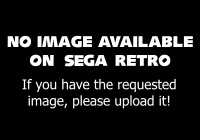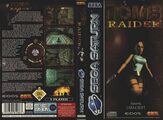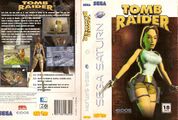Difference between revisions of "Tomb Raider"
From Sega Retro
| Line 264: | Line 264: | ||
{{rom|SAT|sha1= |md5= |crc32= |size=512,192,688|date=1996-12-04|source=CD-ROM (JP)|comments=T-6010G, T-9113G V1.000|quality=good|prototype=}} | {{rom|SAT|sha1= |md5= |crc32= |size=512,192,688|date=1996-12-04|source=CD-ROM (JP)|comments=T-6010G, T-9113G V1.000|quality=good|prototype=}} | ||
{{rom|SAT|sha1= |md5= |crc32= |size=494,162,256|date= |source=CD-ROM (US)|comments=T-7910H V1.000|quality=good|prototype=}} | {{rom|SAT|sha1= |md5= |crc32= |size=494,162,256|date= |source=CD-ROM (US)|comments=T-7910H V1.000|quality=good|prototype=}} | ||
| + | }} | ||
| + | ===Extra content=== | ||
| + | {{ExtraTable|console=SAT|region=JP| | ||
| + | {{ExtraTableRow|\DATA\SAVE\DOCUMENT.TXT|TXT|4,595|Messages from the developers.}} | ||
| + | {{ExtraTableRow|SMP_ABS.TXT|TXT (Abstract)|42|About this game.}} | ||
| + | {{ExtraTableRow|SMP_BIB.TXT|TXT (Bibliographiced)|64|About this game}} | ||
| + | {{ExtraTableRow|SMP_CPY.TXT|TXT (Copyright)|88|Copyright}} | ||
}} | }} | ||
Revision as of 10:59, 9 February 2019
| Tomb Raider | ||||||||||||||||||||||||||||||||||||||||
|---|---|---|---|---|---|---|---|---|---|---|---|---|---|---|---|---|---|---|---|---|---|---|---|---|---|---|---|---|---|---|---|---|---|---|---|---|---|---|---|---|
| System(s): Sega Saturn | ||||||||||||||||||||||||||||||||||||||||
| Publisher: Sega (EU), Eidos (US), Victor Soft (JP) | ||||||||||||||||||||||||||||||||||||||||
| Developer: Core Design | ||||||||||||||||||||||||||||||||||||||||
| Sound driver: SCSP/CD-DA (56 tracks) | ||||||||||||||||||||||||||||||||||||||||
| Genre: Action | ||||||||||||||||||||||||||||||||||||||||
| Number of players: 1 | ||||||||||||||||||||||||||||||||||||||||
| ||||||||||||||||||||||||||||||||||||||||
This short article is in need of work. You can help Sega Retro by adding to it.
Tomb Raider is a highly successful video game developed by Core Design and published by Eidos in 1996. It was the first in a long line of Tomb Raider games. Victor Soft published the game in Japan, pluralizing the title to Tomb Raiders (トゥームレイダース).
Initially developed with the PlayStation in mind, the game was ported to the Sega Saturn (whose version shipped in Europe six weeks earlier than the PlayStation and PC releases due to a licensing deal with Sega) and PCs, becoming Core's most successful video game project to date and a video game icon.
Contents
Gameplay
At the time of release Tomb Raider was considered a revolutionary title, combining platforming, puzzle solving and action sequences together in a 3D environment, something that, until this point, had not been done before. It was often said to be a 3D alternative to Prince of Persia (until, of course, 3D Prince of Persia games were released). Tomb Raider was also notable for starring a female protagonist, Lara Croft.
Levels
| Caves | |
|---|---|
| City of Vilcabamba | |
| Lost Valley | |
| Tomb of Qualopec | |
| St. Francis' Folly | |
| Colosseum | |
| Palace Midas | |
| The Cistern | |
| Tomb of Tihocan | |
| City of Khamoon | |
| Obelisk of Khamoon | |
| Sanctuary of the Scion | |
| Natla's Mines | |
| Atlantis | |
| The Great Pyramid | |
History
Development
Tomb Raider was one of the first true 3D titles to be undertaken by Core Design, following a trip to the States in which producer Jeremy Heath-Smith caught wind of Sony's PlayStation console and asked the company to come up with ideas for 3D games. Tomb Raider was put forward by BC Racers animator Toby Gard, who did the bulk of the design work surrounding Lara Croft and her in-game animations.
Eidos and Core signed a deal with Sega to ship the game six weeks early in Europe as an exclusive title on the Sega Saturn
Release
While Tomb Raider became one of the best selling Saturn games on the market, US Saturn sales were less than a quarter of the PlayStation total[3].
Legacy
Tomb Raider II was planned for release on the Saturn, but was eventually cancelled for the platform.
With the Saturn's failure to attract the greater market share, development for the sequels were focused on Sony's console, and Lara Croft became an unofficial mascot for the system. The Tomb Raider series would not see a return to Sega platforms until Tomb Raider: The Last Revelation on the Sega Dreamcast.
The original Tomb Raider was re-made in the 2007 release of Lara Croft Tomb Raider: Anniversary.
Versions
Despite being the target platform for the game, the Sega Saturn version of Tomb Raider is considered to be the weakest version, primarily due to not being optimized for the way the Saturn hardware handles 3D graphics. On a technical level, the VDP2 is rarely used in the game, with the vast majority of work being handled by the VDP1, thereby using only a fraction of the Saturn's power. The European Saturn version also have minor differences to level layouts (specifically some secret areas) because it was rushed to launch three months before the PlayStation version. This was fixed in the North American and Japanese versions.
The Saturn Tomb Raider runs faster than its PlayStation counterpart in some situations, but while the PlayStation targets and largely maintains a 30 FPS refresh rate, the Saturn struggles to maintain 20 FPS. The Saturn version also lacks reflections on the save crystals as well as alpha transparency.
On the other hand, the PlayStation version lacks perspective correction and has issues with texture warping and polygon seams, whereas the Saturn's forward texture mapping provides some perspective correction, its bilinear approximation reduces texture warping, and higher polygon accuracy results in almost seamless polygons. The Saturn version also has refractive water surfaces, which both the PlayStation and PC versions lack.
The Saturn version had smoother Gouraud shading, whereas the PlayStation version had color banding, when running on the original PlayStation hardware released from 1994 to 1995. The color banding was eventually eliminated on the new PlayStation hardware, which improved the system's transparency and shading capabilities. The PlayStation version is thus able to have smooth shading when running on newer PlayStation models, despite the PlayStation version originally not having smooth shading upon the game's release in 1996. (See Sega Saturn: Hardware comparison for more technical details).
The Saturn version is also darker in comparison, due to the way Gouraud shading works on the Saturn hardware. The Saturn's VDP1 uses additive shading, which often results in darker shadows but more shades, whereas the PlayStation's GPU uses multiplicative shading, which often results in brighter lights but less shades.
Pre-rendered videos are slightly smaller in terms of resolution, although the Saturn's D-Pad is regarded as being more suitable to this game than the PlayStation's. Sound effects are sampled at a lower bit-rate than on the PlayStation too.
Against the PC DOS version, the Saturn (and PlayStation) versions of the game offer more varied music (the PC opting merely for ambiance due to disc space restrictions) and higher colour depth (the PC restricted to 8-bit colour, i.e. a palette of 256 colours, due to the use of a software renderer). The PC version does, however, have the option to run in a 640x480 mode (and a lower 320x200 mode), though in 1996 this was only achievable with high-end hardware. By 1998, PC versions of Tomb Raider had been adapted to multiple 3D graphics cards to address some of these graphical concerns, and fan-made mods allow the game to benefit from modern systems.
Localised names
| Language | Localised Name | English Translation |
|---|---|---|
| English | Tomb Raider | Tomb Raider |
| English (US) | Tomb Raider | Tomb Raider |
| Japanese | トゥームレイダース | Tomb Raiders |
Production credits
Western version
- Created by: Neal Boyd, Paul Douglas, Toby Gard, Heather Gibson, Jason Gosling, Gavin Rummery
Japanese version
- Programming: Paul Douglas, Gavin Rummery, Jason Gosling
- Graphics: Toby Gard, Heather Gibson, Neal Boyd
- Sound Effects: Martin Iveson
- Music: Nathan McCree
- Software Evaluation: Ryo Misawa
- Directer: Gaku Sato
- Assistant: Inazou Urano, Hiroki Takasu PTW
- Lara: Megumi Ogata
- Natla: Michie Tomizawa
- Larsen: Wataru Takagi
- Pierre: Yasuhiro Ishii
- Baldy: Masaru Sasahara
- Cowboy: Yuzi Ueda
- SkateKid: Kousuke Okano
Magazine articles
- Main article: Tomb Raider/Magazine articles.
Promotional material
- Main article: Tomb Raider/Promotional material.
Physical scans
| Sega Retro Average | |||||||||||||||||||||||||||||||||||||||||||||||||||||||||||||||||||||||||||||||||||||||||||||||||||||||||||||||||||||||||||||||||||||||||||||||||||||||||||||||||||||||||
|---|---|---|---|---|---|---|---|---|---|---|---|---|---|---|---|---|---|---|---|---|---|---|---|---|---|---|---|---|---|---|---|---|---|---|---|---|---|---|---|---|---|---|---|---|---|---|---|---|---|---|---|---|---|---|---|---|---|---|---|---|---|---|---|---|---|---|---|---|---|---|---|---|---|---|---|---|---|---|---|---|---|---|---|---|---|---|---|---|---|---|---|---|---|---|---|---|---|---|---|---|---|---|---|---|---|---|---|---|---|---|---|---|---|---|---|---|---|---|---|---|---|---|---|---|---|---|---|---|---|---|---|---|---|---|---|---|---|---|---|---|---|---|---|---|---|---|---|---|---|---|---|---|---|---|---|---|---|---|---|---|---|---|---|---|---|---|---|---|---|
|
| 90 | |
|---|---|
| Based on 33 reviews | |
| Saturn, JP (Satakore) |
|---|
Technical information
ROM dump status
| System | Hash | Size | Build Date | Source | Comments | |||||||||
|---|---|---|---|---|---|---|---|---|---|---|---|---|---|---|
| ✔ |
|
494,705,568 | CD-ROM (EU) | MK81086-50 V1.000 | ||||||||||
| ✔ |
|
512,192,688 | 1996-12-04 | CD-ROM (JP) | T-6010G, T-9113G V1.000 | |||||||||
| ✔ |
|
494,162,256 | CD-ROM (US) | T-7910H V1.000 |
Extra content
This game has extra content which can be viewed when accessing the disc on a PC.
| Folder / File | Type | Size | description |
|---|---|---|---|
| \DATA\SAVE\DOCUMENT.TXT | TXT | 4,595 | Messages from the developers. |
| SMP_ABS.TXT | TXT (Abstract) | 42 | About this game. |
| SMP_BIB.TXT | TXT (Bibliographiced) | 64 | About this game |
| SMP_CPY.TXT | TXT (Copyright) | 88 | Copyright |
References
- ↑ Computer & Video Games, "November 1996" (UK; 1996-10-09), page 49
- ↑ 2.0 2.1 2.2 Computer & Video Games, "December 1996" (UK; 1996-11-xx), page 74
- ↑ Ultra Game Players, "August 1997" (US; 1997-07-22), page 14
- ↑ 4.0 4.1 Mean Machines Sega, "December 1996" (UK; 1996-11-01), page 28
- ↑ 5.0 5.1 Mega Force, "Novembre/Décembre 1996" (FR; 1996-1x-xx), page 78
- ↑ 6.0 6.1 Sega Saturn Magazine, "November 1996" (UK; 1996-10-17), page 70
- ↑ 7.0 7.1 Sega Saturn Magazine, "1997-02 (1997-01-31)" (JP; 1997-01-17), page 224
- ↑ 8.0 8.1 Sega Saturn Magazine (readers), "Final data" (JP; 2000-03), page 11 Cite error: Invalid
<ref>tag; name ":File:SnGwSISDRZK Book JP.pdf_p11" defined multiple times with different content - ↑ Ação Games, "Março 1997" (BR; 1997-xx-xx), page 26
- ↑ CD Consoles, "Novembre 1996" (FR; 1996-xx-xx), page 84
- ↑ Digitiser (UK) (1996-11-06)
- ↑ Famitsu, "1997-01-31" (JP; 1997-01-17), page 1
- ↑ Fun Generation, "12/96" (DE; 1996-11-13), page 82
- ↑ Gambler, "1/1997" (PL; 1997-xx-xx), page 1
- ↑ GameFan, "Volume 4, Issue 12: December 1996" (US; 1996-xx-xx), page 20
- ↑ GamePro, "January 1997" (US; 1997-xx-xx), page 112
- ↑ Game Informer, "November 1996" (US; 1996-1x-xx), page 12
- ↑ Hacker, "12/1996" (HR; 1996-xx-xx), page 57
- ↑ Hobby Consolas, "Noviembre 1996" (ES; 1996-xx-xx), page 68
- ↑ Intelligent Gamer, "December 1996" (US; 1996-1x-xx), page 85
- ↑ Joypad, "Novembre 1996" (FR; 1996-1x-xx), page 82
- ↑ Level, "5/97" (TR; 1997-xx-xx), page 1
- ↑ MAN!AC, "12/96" (DE; 1996-11-13), page 72
- ↑ Mega Fun, "12/96" (DE; 1996-11-20), page 44
- ↑ Next Generation, "January 1997" (US; 1996-12-17), page 182
- ↑ Player One, "Novembre 1996" (FR; 1996-xx-xx), page 85
- ↑ Power Up!, "Saturday, November 16, 1996" (UK; 1996-11-16), page 1
- ↑ Saturn Fan, "1997 No. 2" (JP; 1997-01-17), page 187
- ↑ Saturn Fan, "1997 No. 5" (JP; 1997-02-28), page 98
- ↑ Saturn+, "Issue 5" (UK; 1996-12-19), page 7
- ↑ Secret Service, "Styczeń 1997" (PL; 1997-01-01), page 62
- ↑ Sega Power, "December 1996" (UK; 1996-10-24), page 40
- ↑ Total Saturn, "Volume One Issue Two" (UK; 1996-09-30), page 32
- ↑ Total Saturn, "Volume One Issue Four" (UK; 1996-12-29), page 60
- ↑ Videogame Advisor, "Volume 2, Number 10: October 1996" (US; 1996-0x-xx), page 41
| Tomb Raider | |
|---|---|
|
Main page | Comparisons | Hidden content | Development | Magazine articles | Video coverage | Reception | Promotional material
Demos: Tomb Raiders Taikenban Hibaihin (1997) | |
| Tomb Raider games for Sega systems | |
|---|---|
| Tomb Raider (1996) | Tomb Raider II (unreleased) | |
| Tomb Raider: The Last Revelation (2000) | Tomb Raider: Chronicles (2000) | |
| Sampler Discs | |
| Tomb Raiders Taikenban Hibaihin (1997) | |
- Pages with reference errors
- 1 player games
- JP Saturn games
- All JP games
- US Saturn games
- All US games
- EU Saturn games
- All EU games
- PT Saturn games
- All PT games
- AU Saturn games
- All AU games
- BR Saturn games
- All BR games
- Saturn games
- 1996 Saturn games
- All 1996 games
- Saturn action games
- All action games
- Old content rating field
- All games
- Stubs
- Credits without source
- Credits without reference
- Old-style rating (cvg)
- Old-style rating (famitsu)
- Rating without PDF source
- Old-style rating (gamesmaster)
- Old-style rating (hobbyconsolas)
- Rating without source
- Old-style rating (mms)
- Old-style rating (megaforce)
- Old-style rating (playerone)
- Old-style rating (segapower)
- Old-style rating (ssm)
- Old-style rating (ssmjp)
- Old-style rating (ssmjp r)
- Update ratings template
- 11 old ratings
- Missing ROM hashes
- Old technical information
- Saturn games with bonus PC content
- Tomb Raider
- Tomb Raider (franchise)













